A decade with iPhone: Thoughts on its impact

 |
| Apple celebrates the iPhone's 10th anniversary in 2017. [File photo] |
The Apple iPhone celebrated its 10th Anniversary a few weeks ago. The impact of the revolutionary iPhone was substantial.
Role of design. In a general sense, the iPhone showed the importance and power of great design. Back at Apple's helm, Steve Job's grand obsession was to build products that did far more than function and be easy use. He wanted his products to bring about transformational change in people's lives, to become part of the culture. Jobs subscribed to Canadian designer Robert L Peter's belief that: "Design creates culture. Culture shapes values. Values determine the future."
Jobs also knew that the successful roadmap to transformational design is never easy and seldom smooth. As Steve Jobs noted: "Sometimes when you innovate, you make mistakes. It is best to admit them quickly, and get on with improving your other innovations." The first few years of iPhone were not illustrious, with many complaints about the lack of appx the tie-in to designated telecommunications providers. Now after a decade, the ‘wow' factor of successive models seems to be waning somewhat showing that sustained innovation is difficult to achieve. During the keynote Jobs said it was rare enough for a company to revolutionize even one product category. Apple had already revolutionized two: PC's with the Mac and personal music players with the iPod. Now with the iPhone, they had achieved three and on a roll.
Disruption. In the digital economy disruption is the norm and those who thrive will be good at disruption, including anticipating the future and even willing to disrupt their own past successful models in order to prepare for the future. The advent of the iPhone overtook and disrupted those products focused on handsets and use of a stylus. Previous phones needed an instruction booklet to learn how to use them. Steve Jobs understood, as does Elon Musk today, that "Any product that needs a manual to work is broken." With the iPhone people could now input directly on to their screen with multi-touch capacity. Indeed, Apple with the iPhone made the touch screen common place, even though others had been working on it in previous years.
Apple also disrupted the world of mobile gaming. Before the iPhone App Store came along, mobile gaming occurred through pocket gaming systems from companies like Nintendo and Sony. The mobile game industry is now skyrocketing, especially in China, and the iPhone was a major catalyst worldwide in this rise in gaming activity.
The convenience and rapidly improving phone camera and supporting applications also challenged the stand alone digital camera market.
Changed software distribution. The iPhone transformed the world of software apps. While cell phone app stores and apps had been around for years before Apple iPhone, the process of finding apps online and downloading and uninstalling them was not cumbersome and complex for the average user. With the iPhone users had to set up an iTunes account with credit card and password and this facilitated easy location of apps, download, payment and uninstalling of applications
Convergence. Modern technologies are increasingly converging with products today connecting with one another in a phenomenon known as the Internet of Things. The iPhone converged the worlds of music and phones. The features and system behind the iPhone brought together the phone and music, the internet, photographs and more into a single easy to use and beautifully designed platform supported by the cloud.
Apple showed that customer is not always right. Innovators are people of vision and sometimes that vision is far ahead of the mass population. For example, commenting on the invention of the automobile, Henry Ford observed that: "If I had asked people what they wanted, they would have said faster horses." Before the iPhone, few people, including me, would have contemplated using an on-screen keyboard on a phone. Indeed, many iPhone users asked for an external advice to make this possible, but Apple wouldn't cooperate. Instead, they drove demand until gradually the masses became accustomed to and approving of this new reality.
Growth of Apple as a global brand. The iPhone was a global phenomenon. Different parts were made production roles undertaken in multiple countries, including China. The iPhone was also successful across cultures and countries winning markets almost everywhere. Even markets, for example, in Japan, with traditionally strong loyalty to home-grown products, the iPhone made its mark. The iPhone won converts everywhere. Moreover, as PC users began to experience products such as the iPhone, iPod, and iPad, leading many traditional PC adherents to adopt for the first time the Apple family of products.
Implications for education. To a large extent formal education remains locked into a paradigm befitting an Industrial Age where workers needed to show up on time and follow instructions and leave the creativity and thinking to management. In an Information Age the premium must be on innovation, creativity, entrepreneurship and related skills. Speaking of design 20th century inventor, mathematician and futurist, Buckminster Fuller, indicated that: "A designer is an emerging synthesis of artist, inventor, mechanic, objective economist, and evolutionary strategist." More generally, writer, Daniel Pink argues that in a Digital Age these skills should be part of all education: "The future belongs to a different kind of person with a different kind of mind: artists, inventors, storytellers-creative and holistic ‘right-brain' thinkers whose abilities mark the fault line between who gets ahead and who doesn't."
Conclusion: Apple changed the way phones worked, what they could do and how they related to other areas of peoples' lives. This in turn changed the way people worked, played and functioned in society. The iPhone reminds us that while good design is useful, great design is transformational—lessons that all organizations and individuals should take to heart.


































